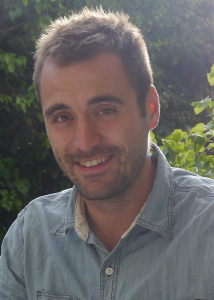 After an exchange semester at the University of Manchester and a BSc in Chemistry from Georg-August-University in Göttingen, Max worked on “green” additives in the Department of “Polymer Morphology and Surface Effects” of BASF in Basel, Switzerland. He then transferred to Free University of Berlin where he studied high temperature catalysis in short-contact-time reactors in the Fritz-Haber Institute of the Max-Planck Society. Furthermore, he had the chance to participate in the graduate program of material science at the University of California Santa Barbara (UCSB) and to work in the group of Fred Wudl in the field of organic electronics. Max finished his MSc in Chemistry with a research project on “Synthesis and Modification of Novel Diketopyrrolopyrrol-(DPP)-based Polymers for Application in Organic Electronics” at BASF. Max started his PhD in the laboratory of Soft Matter and Chemistry (Matière Molle et Chimie, MMC) in the group of Prof. Leibler at ESPCI Paris-Tech in October 2013.
After an exchange semester at the University of Manchester and a BSc in Chemistry from Georg-August-University in Göttingen, Max worked on “green” additives in the Department of “Polymer Morphology and Surface Effects” of BASF in Basel, Switzerland. He then transferred to Free University of Berlin where he studied high temperature catalysis in short-contact-time reactors in the Fritz-Haber Institute of the Max-Planck Society. Furthermore, he had the chance to participate in the graduate program of material science at the University of California Santa Barbara (UCSB) and to work in the group of Fred Wudl in the field of organic electronics. Max finished his MSc in Chemistry with a research project on “Synthesis and Modification of Novel Diketopyrrolopyrrol-(DPP)-based Polymers for Application in Organic Electronics” at BASF. Max started his PhD in the laboratory of Soft Matter and Chemistry (Matière Molle et Chimie, MMC) in the group of Prof. Leibler at ESPCI Paris-Tech in October 2013.
Research
A novel class of materials, coined vitrimers, has recently been discovered in the laboratory. Vitrimers are unique networks capable of reorganizing themselves without altering their crosslinking density. These novel materials go from the liquid to the solid state or vice versa, yet they are insoluble. Most importantly, vitrimers are reshapeable at will and can be repaired and recycled under the action of heat.1-3 This property means that they can undergo transformations using methods that cannot be envisaged either for thermosetting resins or for conventional plastic materials.
The first vitrimer materials developed in the laboratory were epoxy networks whose unique processing and recycling properties were relying on transesterification reactions.
In order to extend the concept of vitrimers to a broader range of polymer matrices as well as to optimize processing and recycling conditions of these materials, the Soft Matter and Chemistry Laboratory is developing and testing new dynamic covalent reactions compatible with vitrimer technology.
The goal of this project is to optimize the synthesis of the next generation of vitrimers as well as to perform in depth material characterization (chemical: NMR, IR, SEC, GC; physical and mechanical: rheology, DMA, traction). The healibility and recyclability of the material will also be tested according to procedures recently developed in the laboratory. Studies and optimization of the processability of the materials will also be conducted.
1. D. Montarnal, M. Capelot, F. Tournilhac, L. Leibler, Science 2011, 334, 965
2. M. Capelot, D. Montarnal, F. Tournilhac, L. Leibler, J. Am. Chem. Soc. 2012, 134, 7664
3. M. Capelot, M. M. Unterlass, F. Tournilhac, L. Leibler, ACS Macro Letters 2012, 1, 789

 Saving...
Saving...